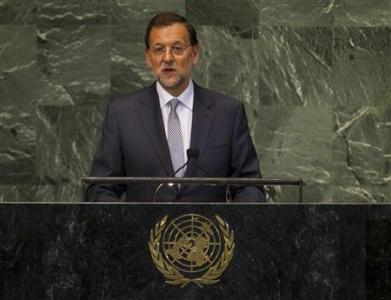(Reuters) – Violent protests in Madrid and growing talk of secession in Catalonia are piling pressure on Spanish Prime Minister Mariano Rajoy as he moves closer to asking Europe for rescue money.

In public, Rajoy has been resisting calls from bankers at home and the leaders of France and Italy to move quickly to request assistance, but behind the scenes he is putting together the pieces to meet the stringent conditions for aid.
With protesters stepping up anti-austerity demonstrations, Rajoy presents painful economic reforms and a tough 2013 budget on Thursday, aiming to persuade euro zone partners and investors that Spain is doing its deficit-cutting homework despite a recession and 25 percent unemployment.
Figures released on Tuesday suggested Spain will miss its public deficit target of 6.3 percent of gross domestic product this year, and on Wednesday the central bank said the economy continued to contract sharply in the third quarter.
By pre-empting reforms demanded by Brussels — such as creating an independent fiscal auditor — Rajoy hopes to sell them to voters as home-grown rather than imposed from outside.
Diplomats reported intense last-minute pressure on Madrid on Wednesday from key euro zone policymakers to take tougher measures, notably on freezing pensions.
On Friday, Moody’s will publish its latest review of Spain’s credit rating, possibly downgrading the country’s debt to junk status.
On the same day, an independent audit of Spain’s banks will reveal how much money Madrid will need from a 100 billion euro ($130 billion) aid package that Europe has already approved for the banks.
A STEP CLOSER
Rajoy is gradually shedding his reluctance to seek a sovereign bailout for the euro zone’s fourth biggest economy – a condition for European Central Bank intervention to cut his country’s borrowing costs.
He suggested in an interview published on Wednesday that he would make the move if debt financing costs remained too high for too long.
“I can assure you 100 percent that I would ask for this bailout,” he told the Wall Street Journal, calling the situation he faces right now “fascinating”.
He also said he had not made his mind up on whether to maintain inflation indexation of pensions, which could cost the state an extra 6 billion euros this year.
“We need to be sufficiently flexible in order not to create any further problems,” he said when asked about pensions.
The interview, the central bank’s warning on the third quarter and other factors drove up Spain’s borrowing costs, with the yield on the benchmark 10-year bond jumping to 6 percent on Wednesday, a level seen as unsustainable in the medium term.
The blue-chip index of leading stocks fell 3.46 percent to a two-week low, with heavyweight banks BBVA and Santander leading the way.
Markets were also reacting to a letter from Germany, Finland and the Netherlands on Tuesday that implied that rescue funds Spain receives for its banks will remain on its public debt. The three said any future direct recapitalization of banks by the euro zone’s bailout fund should not cover “legacy” problems.
CATALONIA INDEPENDENCE MOVEMENT
The government’s drive to rein in regional overspending as part of its austerity measures has prompted a flare-up in independence fervor in Catalonia, the wealthy northeastern region that generates one-fifth of Spain’s economic output.
Just as the euro zone crisis has strained relations between wealthier nations of the north and heavily indebted countries to the south, Spain’s crisis has aggravated tensions between the central government and its self-governing regions.
Catalonia needs a 5 billion euros bailout from the central state to meet debt payments this year, but Catalans are convinced they bear an unfairly large share of the country’s tax burden.
More than half say they want independence from Spain, the highest level ever.
Artur Mas, the conservative president of Catalonia, announced on Tuesday he would hold early elections in November after Rajoy rejected his call for more tax autonomy. Mas’s Convergence and Union, or CiU, party is likely to win an absolute majority in the regional parliament, which he can use to battle Rajoy over spending cuts.
On Wednesday Mas took things further, saying Catalonia should also hold a referendum on independence, which the central government says would be unconstitutional.
Although an independent Catalonia is a remote possibility, the political instability sends a worrying message to investors. Rajoy’s People’s Party has threatened to take control of the budgets of regions that fail to meet deficit reduction targets despite Catalonia already having made tough austerity measures.
Analysts said Mas, who until recently expressed more moderate aims for Catalan autonomy, was playing a dangerous game.
“In the short term it’s not going to help in any way, it’s going to increase, if this is at all possible, the lack of confidence in the future of Spain,” said Javier Diaz-Gimenez, professor of economics at IESE.
COMMUNICATION PROBLEMS
Anti-austerity groups planned a fresh demonstration on Wednesday evening in Madrid, a day after police fired rubber bullets at thousands of protesters who tried to form a human chain around the parliament building.
Police arrested 35 protesters on Tuesday and 64 police and demonstrators were injured in the clashes.
The relatively small but intense protests this week have added to Rajoy’s image problems abroad.
Officials in Brussels and Berlin have accused him of failing to sell his reforms effectively, partly because of confusing messages from his separate treasury and economy ministers and from his own office.
“The problem in the structure of his economic cabinet is transmitting a confused, improvised image,” said an economist, who did not want to be named and who said Rajoy will have to name a powerful economic deputy by the end of the year to sort out his communications issues.
The governments of Ireland, Portugal and Greece were all voted out of office after they sought bailouts from Europe.
But Rajoy may have more staying power, especially if he negotiates a bailout “lite”, such as a precautionary credit line from the European bailout fund that would not involve taking Spain out of the credit markets.
The uncharismatic conservative has more than three years left to his term and his People’s Party has firm control of parliament, with no signs so far of party splits that might force him out early.
(Additional reporting by Paul Day; Editing by Paul Taylor)





